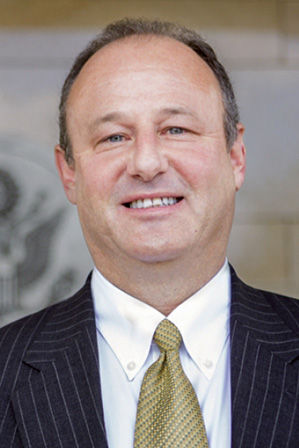Back to the Gilded Age?
President’s Views
BY ERIC RUBIN

The 19th century was a time of excess in our country. Acute partisanship and violence led to a bloody civil war that killed more than 600,000 Americans, based on division over the evil institution of slavery and the compromises our Founding Fathers had made to accommodate it. And there was an excess of political corruption and politicization that led to the so-called Gilded Age in which federal jobs were treated as the spoils of political victory.
Starting with President Andrew Jackson, federal jobs were treated as rewards for partisan supporters and as a way to ensure that loyalists were in every key position. President James A. Garfield’s assassination in 1881 by the disgruntled Charles J. Guiteau—who believed he helped get Garfield elected and thus deserved a consul position in Vienna or Paris—marked the low point for our government’s ability to serve the American people and not simply the elected politicians of the moment.
Against the toxic brew of corruption, concentrated wealth and partisanship came a wave of talented reformers, led by the ambitious New York Republican politician Theodore “Teddy” Roosevelt.
As he wrote in The Cosmopolitan in May 1892, “the spoils system of making appointments to and removals from office is so wholly and unmixedly evil, is so emphatically un-American and undemocratic, and is so potent a force for degradation in our public life that it is difficult to believe that any intelligent man of ordinary decency who has looked into the subject can be its advocate.”
Serving as U.S. Civil Service Commissioner and later as president, he eradicated the spoils system and laid the groundwork for our national merit-based Civil Service, the Foreign Service and other career federal services.
Reform of the diplomatic service took a bit longer. Representative John Jacob Rogers of Massachusetts led the way, stating in 1923: “Let us strive for a foreign service which will be flexible and democratic; which will attract and retain the best men we have; which will offer reasonable pay, reasonable prospects for promotion, [and] reasonable provision against want when old age comes to a faithful servant.”
The Rogers Act of 1924 created the U.S. Foreign Service. (It was later updated by the Foreign Service Act of 1946 and then 1980.)
The decades that followed saw the expansion of professionalization, writes historian Margaret O’Mara in an opinion piece for The New York Times on Oct. 26, 2019. “Creation of the Foreign Service established a rigorous entry examination and raised pay. The diplomatic corps was no longer limited to rich young men with time and family money to take overseas postings.
“The Hatch Act placed sweeping restrictions on political activity by government officials, including the president’s political appointees,” O’Mara continues. “Merit-based hiring diversified the work force, making the career Civil Service outpace the private sector in representation of women and minorities, especially in executive roles.”
Is all that starting to slip away?
Here we are today, almost 100 years after the creation of the career, professional Foreign Service and almost 140 years after the spoils system was (mostly) abolished.
In the context of a highly polarized political environment, the loss of exceptional diplomatic talent to retirement and resignation has further removed the Foreign Service from its leading role in the policy process—a role mandated by the 1980 Foreign Service Act.
The painful experiences of our colleagues who have been pulled into the impeachment inquiry as witnesses, at great professional risk and personal expense, is illustrative. The historic deficit in career appointees to assistant secretary positions and ambassadorships adds further to this negative direction.
We at AFSA will continue to do everything we can to stand firm in defense of our profession, our Service and our colleagues. At this difficult time for our country, for diplomacy and for the Foreign Service, we must stay true to our oath and commitment to serve the American people.
Join us in supporting our profession and the ideals that underlie our professional and nonpartisan Service.

